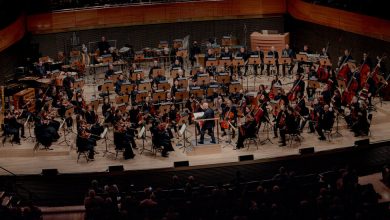Review: In ‘Paradise Square,’ Racial Harmony Turns to Discord

Everything in “Paradise Square” is true. Nothing in “Paradise Square” is true.
Yes, history shows that in 1863, after Abraham Lincoln extended the Civil War draft to include all white men between the ages of 25 and 45 — Black men being excepted because they were not considered citizens — mobs of disgruntled Irish Americans rose up against Black people in New York, burning buildings and killing many in their path.
And it’s true that in the impoverished, piano-shaped district of downtown Manhattan called Five Points, some Black and Irish neighbors who had been living together in relative harmony joined forces to resist the mobs.
But in hammering these large-scale events into individual stories, and in manipulating them so performers have reason to sing at top volume and dance nearly nonstop, the uplifting, star-making, overwrought new musical, which opened on Sunday at the Ethel Barrymore Theater, turns history on its head. Racism becomes an individual character flaw instead of a systemic evil; resistance, the solitary moral genius of a hero.
In this case, the hero is Nelly O’Brien, or really Joaquina Kalukango, who plays her with enough guts, stamina and vocal bravura to make you believe in a character glued together from the shavings of history. Nelly is the proprietor of a (fictional) Five Points bar and brothel called Paradise Square: “a little Eden” where, as one of the bald lyrics by Nathan Tysen and Masi Asare puts it in the title song, “We love who we want to love/with no apology.”
Indeed, Nelly is married to the Irish American Willie O’Brien (Matt Bogart, suitably strapping). His sister (and Nelly’s best friend), Annie Lewis (Chilina Kennedy, absurdly fierce), is married to a Black minister, the Rev. Samuel Jacob Lewis (Nathaniel Stampley). When Annie’s nephew Owen (A.J. Shively) arrives from Ireland, around the same time that Samuel, a stationmaster on the Underground Railroad, brings Washington Henry (Sidney DuPont) to Paradise Square en route from Tennessee to Canada, the joint begins to seem like a rooming house for incendiary plot points.
Most of the characters — and there are 10 major roles — seem less like people than ideas with human masks. Willie’s war buddy Mike Quinlan (Kevin Dennis) represents the unemployed Irish workers easily swayed by demagogic politicians. A white pianist and composer who turns plantation tunes into uptown hits (Jacob Fishel) represents, somewhat anachronistically, the problem of cultural appropriation — though it’s a nice touch that some Stephen Foster songs, like “Camptown Races,” are reappropriated in Jason Howland’s music.
Another Foster song — “Oh! Susanna” — gets an even more interesting overhaul, insidiously connecting the show’s all-purpose villain, Frederic Tiggens, as he fans the Irish rebellion, to racist Southern tropes. (Foster’s melody is reset with the lyric “You were true to a country that wasn’t true to you.”) Alas, none of Tiggens’s dialogue is as subtle; a vaguely defined “uptown party boss” set on shutting down the “depravity” of places like Paradise Square, he leaves the performer John Dossett little to do but metaphorically twirl his mustaches.
If most of the score suffers from a mild case of overstatement — whipping up a series of generic rock ballads and throat-shredding anthems — the book and staging suffer from full-blown emphasitis. The book, credited to Christina Anderson, Craig Lucas and Larry Kirwan, is especially problematic. Based on Kirwan’s musical play “Hard Times,” and apparently rewritten heavily in nine years of development, it strips everything down to the naked basics as it tries to accommodate so many characters along with a checklist of sensitivities.
I’m a sucker as much as the next critic for liberal pieties, and I appreciate the stance of a musical centered on Black lives that has its heroine say, near the end, “We pass on to you this story on our own terms.” But strong stances do not make up for weak characterization or suggest why such strength is necessary. That the position of the Irish and other white immigrants is not nearly as effectively dramatized as that of the Black characters is morally good but theatrically dull.
In that combination, I feel the meaty hand of the producer Garth H. Drabinsky, who seems to have used his influence to shape “Paradise Square” into a likeness of his previous hits. Like “Ragtime” in 1998 and the 1994 revival of “Show Boat,” it frames social unrest as the product of a few representative individuals and tries to fill the inevitable gaps with big sound and stagecraft. It also borrows a famous plot device from “Show Boat” — which is effective here even if the debt goes otherwise unpaid.
But unlike those musicals, which were built on the frames of strongly written novels by authors with singular voices, “Paradise Square” feels almost authorless despite its many contributors, and the direction of Moisés Kaufman, known for a strong hand and conceptual coherence, does little to erase the impression of anonymity. (The design elements are likewise merely efficient.) Contingent and anxious, the show seems more interested in saying the right things than in telling a coherent story.
Wait — I take that back: It does tell a coherent story, in two ways. One is in the dancing, which employs a kaleidoscopic crash of contextual styles, including step dance for the Irish characters and Juba for the Black ones, to explore, far more subtly than the book, the place where appropriation and joyful sharing meet. (If unlikely as a plot point, the dance-off between Owen and Washington is a high point emotionally.) Again, many hands are at work here, with Bill T. Jones heading a musical staging team of at least five other choreographers, but the result scores its points effectively.
The other source of coherence in “Paradise Square” is Kalukango, who somehow alchemizes the remarkable difficulties of the role into her characterization, making it incredible in the good way instead of the bad. Having seen her previously as Cleopatra in “Antony and Cleopatra,” Nettie in “The Color Purple” and Kaneisha in “Slave Play,” I am not exactly surprised, but they were more successful pieces of writing. Nothing really prepares you for the moment when an actor brings everything she has to the stage and essentially writes what needs to be said while you watch. It makes you believe in making history.
Paradise Square
At the Ethel Barrymore Theater, Manhattan; paradisesquaremusical.com. Running time: 2 hours and 40 minutes.




